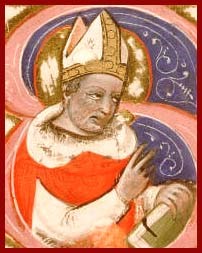– Anastasios
I bet that not many are aware of the existence of a certain Asterius, once Bishop of Amasea (modern Turkey). Not only because he lived many centuries ago (350-410) but also because, let us be honest, he is not one of the most popular early Christian writers. But indeed he is not someone to be taken lightly.
Let us say that even if one may think that it is not easy to know something about him, we need to discover that indeed that were many “Asteriuses” that were quite prominent in early Christian history, something that to us may seem strange because this name is so out of use nowadays (have you ever met someone called Asterius?). But also our own Asterius, the Bishop of Amasea, hasn’t got many things in record regarding his life. We know about him because of his homilies and these are luckily preserved, at least part of them. Catholic Encyclopedia says: “The only fact in his life that is known is related by himself, viz. his education by a Scythian or Goth who had been sent in his youth to a schoolmaster of Antioch and thus acquired an excellent education and great fame among both Greeks and Romans. The extant writings of Asterius are twenty-one homilies, scriptural and panegyrical in content. The two on penance and ‘on the beginning of the fasts’ were formerly ascribed to St Gregory of Nyssa (Bardenhewer, Patrologie, 1901, 267). A life of his predecessor, St Basil, is ascribed to Asterius (Acta SS. 26 April). His works (P.G. XL) are described by Tillemont (Mem., X, 409). He was a student of Demosthenes and an orator of repute. Lightfoot says (Dict. of Christ. Biogr., I, 178) that his best sermons display ‘no inconsiderable skill in rhetoric great power of expression, and great earnestness of moral conviction; some passages are even strikingly eloquent.’ The homilies of Asterius, like those of Zeno of Verona, offer no little valuable material to the Christian archaeologist.” (Shahan, T. (1907). “Asterius.” In The Catholic Encyclopedia: http://www.newadvent.org/cathen/02018a.htm).
And so, let us turn to some passages from his homilies (translated by Galusha Anderson and available in the very precious www.tertullian.org), to have a better idea about the impact of this Bishop. In one Sermon about the rich man and Lazarus he has said: “There was a certain beggar named Lazarus. The narrative describes him not simply as poor, destitute of money, and of the necessaries of life, but also as afflicted with a painful disease, emaciated in body, houseless, homeless, incurable, cast down at the rich man’s gate. And very carefully the narrative finally works up the circumstances of the beggar to signalize the hard-heartedness of him who had no pity; for the man that has no feeling of pity or sympathy for hunger or disease is an unreasoning wild beast in human form, deliberately and wickedly deceiving men; nay more, he is less sympathetic than the very beasts themselves; since, at least, when a hog is slaughtered, the rest of the drove feel some painful sensation and grunt miserably over the freshly spilled blood; and the cattle that stand about when the bull is killed indicate their distress by passionate lowing. Flocks of cranes also when one of their mates is caught in the nets, flutter about him and fill the air with a sort of grieving clamor, seeking to release their mate and fellow. And how unnatural that man, endowed with reason and blessed with culture, who has also been taught goodness by the example of God, should take so little thought of his kinsman in pain and misfortune!”
Or let us read this one about the unjust reward: “You possess an estate, having either inherited it from your fathers, or obtained it by some exchange. Call up therefore in memory and count over, if you can, all who have occupied it before you. And direct your mind also to the time to come, and think how many are to occupy it after you. Then tell me who owns it, and to whom does it especially belong; those who have had it, or those who now have it, or those who in the future are to have it? For if some one should in some way or other call them all together, the owners would be found more numerous than the clods. And, further, if you wish to see exactly what our life is like, call to mind if ever in summer, while traveling, you have seen a flourishing tree extending far enough in breadth and height to serve with its shadow the purpose of a shelter. You were glad to come under its shade, and there you remained as long as possible. And when it was necessary to move on, even as you were thinking of setting off again, another wayfarer appeared. And you took up your luggage while he laid his down and appropriated all your conveniences, the. bed of leaves, the fire, the shade of the tree, the water flowing by. And he began to recline and rest, while you resumed your walk. He, too, enjoyed the place and then left it. And that one tree was, in a single day, the temporary lodging-place for perhaps ten strangers. And that which was enjoyed by all belonged to but one owner. And thus also the abundance of our life here delights and supports many, while it belongs to God alone, who has imperishable and indestructible life.”
Would that these two short passages may create in the reader the willingness to know more about our Asterius, who has so much to say even for our troubled times.


 Follow
Follow


